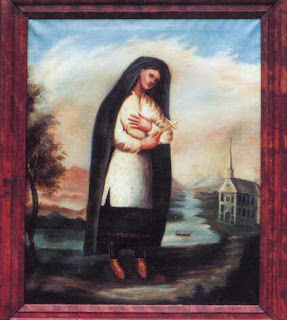 Today, the 14th of July, is the feast of Blessed Kateri Tekakwitha, famed patroness of Native American missions. Her influence within the Native American sphere can be seen by the annual Native American Catholic gathering, the Tekakwitha Conference, and how they chose her as their patron. This conference is an important one, where the difficulties of being Native American and Catholic are addressed: how much of the Native American culture can be or should be embraced? What response should there be for the rampant alcoholism in Native American society? How do Catholics deal with the mixed history of Native Americans missions, where some missions were known to be quite abusive to the peoples within its dominion? Because the gathering draws in representatives of diverse tribal traditions, there usually is no one answer brought out to these questions.
Today, the 14th of July, is the feast of Blessed Kateri Tekakwitha, famed patroness of Native American missions. Her influence within the Native American sphere can be seen by the annual Native American Catholic gathering, the Tekakwitha Conference, and how they chose her as their patron. This conference is an important one, where the difficulties of being Native American and Catholic are addressed: how much of the Native American culture can be or should be embraced? What response should there be for the rampant alcoholism in Native American society? How do Catholics deal with the mixed history of Native Americans missions, where some missions were known to be quite abusive to the peoples within its dominion? Because the gathering draws in representatives of diverse tribal traditions, there usually is no one answer brought out to these questions.
Pope John Paul II attended the 1987 meeting in Phoenix, Arizona, where he showed a deep, heart-felt respect for Native American traditions. Indeed, he had desired to go to it despite his busy schedule, because he saw it necessary to honor the original inhabitants of the Americas and to praise their native virtues. “I have greatly looked forward to this visit with you, the original peoples of this vast country. I greet you with love and respect. And as I greet you, I wish to tell you how pleased I am to find among you one of your sons raised to the episcopate – Bishop Pelotte. I thank you for inviting me to be with you and for sharing with me some aspects of your rich and ancient culture” Pope John Paul II, Meeting with the Native People of the Americas (Phoenix: 9-14-1987), 1. In his speech, he told the Native Americans present to preserve the positive values found within their own cultural traditions, and in doing so, they will not only help themselves, but the whole of humanity:
“I encourage you, as native people belonging to the different tribes and nations in the East, South, West and North,to preserve and keep alive your cultures, your languages, the values and customs which have served you well in the past and which provide a solid foundation for the future. Your customs that mark the various stages of life, your love for the extended family, your respect for the dignity and worth of every human being, from the unborn to the aged, and your stewardship and care of the earth: these things benefit not only yourselves but the entire human family” Pope John Paul II, Meeting with the Native People of the Americas (Phoenix: 9-14-1987), 4.
Clearly these traditions were practiced by Blessed Kateri. Her life in Christ was a fulfillment and extension of her life before baptism; she brought her Native American ways in union with Christ; when she moved to Montreal from New York, to get away from the persecution she received from the people of her tribe, she took the good ideals of her tribe with her, and worked with children and the aged, taking care of them as a Native American would. For the last four years of her life, she was devoted to Christ, and her last words were, “Iesos konoronkwa”, “Jesus I love you.”
But the question remains – what relationship can there be with Catholicism and the pre-Christian Native American practices? The question is not easy to answer, and indeed, Native Americans find themselves split over the answer; some Catholics embrace their cultural heritage, others feel they must abandon it to become a Catholic. Some non-Christians are angered when the two traditions are brought together, feeling it relatives their own faith; others believe a Catholic embrace of Native American traditions helps bring stability and order to the rather fractured society on the reservation. But truly, for the Catholic, the answer has to be as with all cultures, a yes and no – as it was with the Greeks, as it was with the Romans, as it was with the Celts, as it was with the Germans, so it must be with the Native Americans. There is too much in their traditions to ignore, and Catholics can gain from studying them and putting them into practice. For example, we can follow Blessed Kateri and her respect for the environment; is there any surprise that her original Native American spirituality, when baptized into Christ, led her to becoming one of our patrons for ecological awareness?












